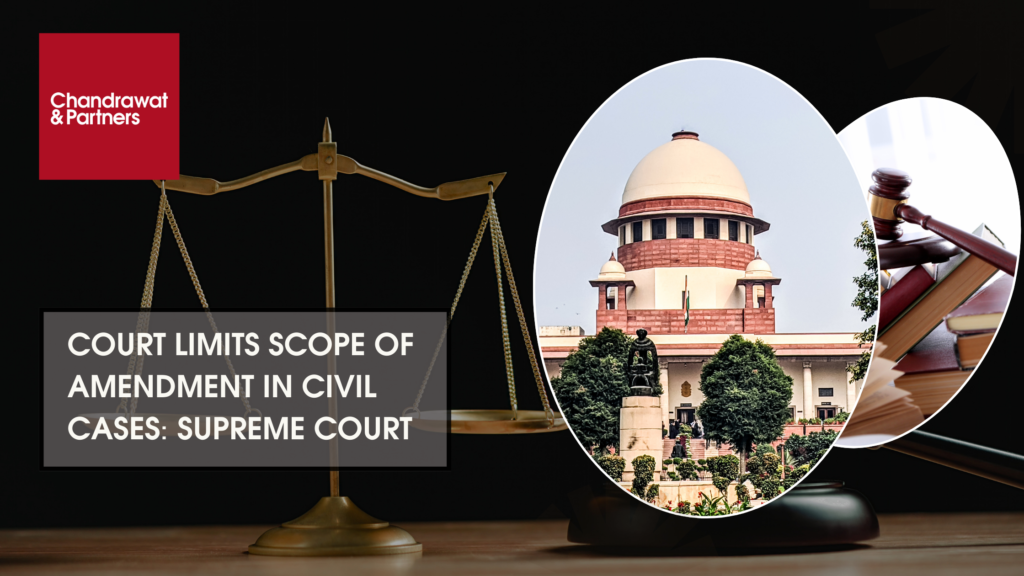Home > Recent Judgements > Court Limits Scope Of Amendment In Civil Cases: Supreme Court
Jan 02, 2025
BACKGROUND
In the case of Basavaraj versus Indira and others, highlights the importance of careful pleading and the limitations on amending pleadings, particularly in cases involving compromise decrees. The dispute arose from a family land. Respondents filed a suit for partition of ancestral property. However, the property in question had been previously subject to a family settlement. A compromise decree had been passed in 2004.
Despite the existence of this prior compromise decree, the plaintiffs initially failed to address it in their suit for partition. They merely asserted their right to a share in the ancestral property without explicitly challenging the validity or effect of the earlier settlement.
The appellant (defendant) raised the issue of the compromise decree in their written statement, arguing that it precluded the plaintiffs’ claim for partition. The plaintiffs, however, remained silent on the matter.
Later, at the end of the trial, the plaintiffs filed an application to amend their plaint. This amendment sought to introduce a new prayer to declare the 2004 compromise decree null and void.
The Trial Court dismissed the application. However, when the order was challenged before the High Court, the same was set aside and the amendment prayed for by the plaintiffs was allowed. Against the decision of the High Court, the appellant preferred the civil appeal before the Supreme Court.
KEY ISSUES
- Whether the failure to exercise due diligence prevent amendment after the trial has commenced?
- Can an amendment application under Order 6 Rule 17 the code of Civil Procedure (“CPC”) alter the fundamental nature of the suit?
LEGAL PROVISION
Order 6 rule 17 CPC gives power to the civil court to allow parties to amend or modify the pleadings at any stage of proceedings but not allows application of amendment after the trial has been commenced unless court concludes that the party did not raise the relevant fact before the commencement of the trial.
Under the Article 59 in part 4 of limitation act, 1963 the limitation for challenging any decree is 3 years.
JUDGEMENT OF THE CASE
The Supreme court stressed that amendments should only be permitted when the party seeking amendment can demonstrate that they exercised “due diligence” in failing to raise the issue earlier. In this case, the plaintiffs’ claim of mere “oversight” was deemed insufficient to justify the late amendment.
The Court recognized that allowing the amendment would significantly prejudice the defendant. The defendant, having relied on the validity of the 2004 decree throughout the proceedings, could have been detrimentally affected by the late introduction of this challenge.
The Court cited a previous case, M. Revanna v. Anjanamma (Dead) by legal representatives and others, where it was established that amendments can be rejected if they introduce entirely new or inconsistent claims, or significantly alter the lawsuit’s core nature.
The Court emphasized that amendments should be requested before the trial starts, not at the very end. In this case, the plaintiffs waited until “the fag end of the suit” to request the amendment. They claimed it was an oversight when filing the initial lawsuit, but the Court found this explanation insufficient for such a significant change at this late stage.
OBSERVATION
For the reason mentioned above, the present appeal is allowed. The impugned order passed by the High Court is set aside. The application filed for amendment of the plaint is dismissed.
The Court held that an amendment should not fundamentally change the nature of the suit. In Basavaraj, the initial suit was for partition. Seeking to declare a prior compromise decree null and void introduced a new and distinct cause of action, effectively transforming the suit into a suit for declaration, which was deemed impermissible under Order 6 Rule 17.
For more information or queries, please email us at
enquiries@chandrawatpartners.com





